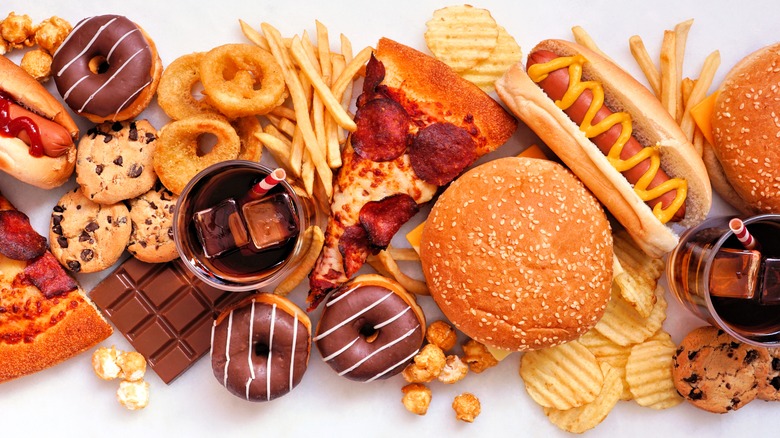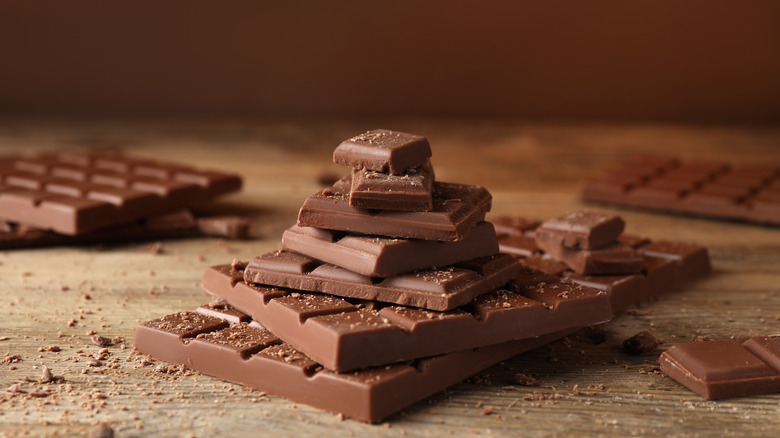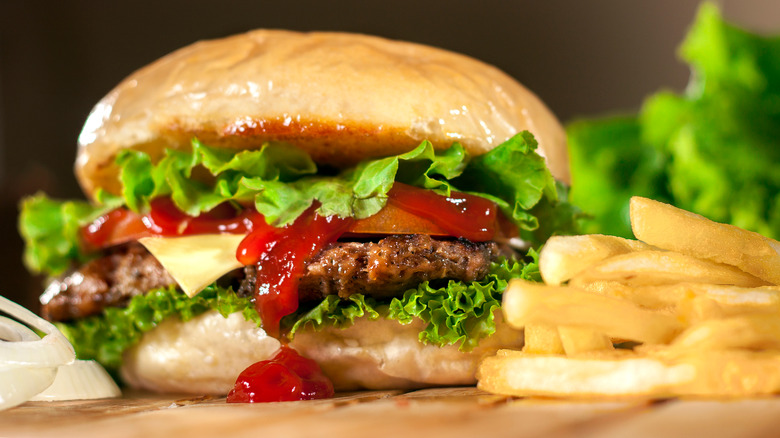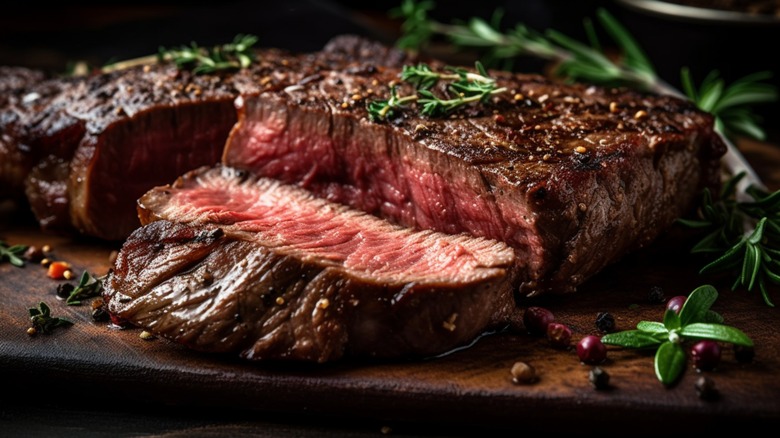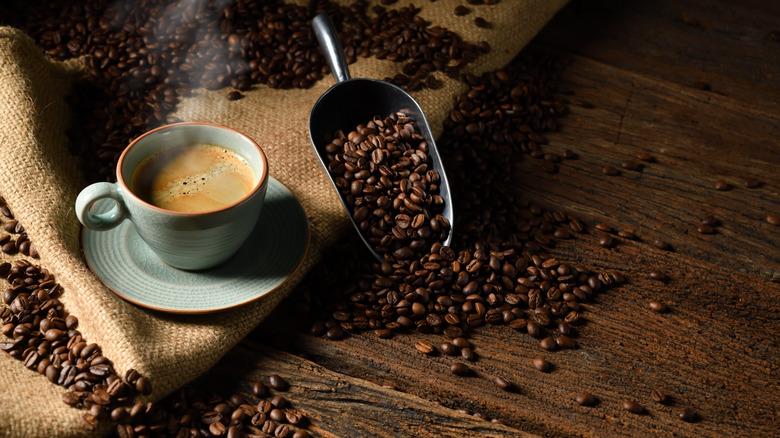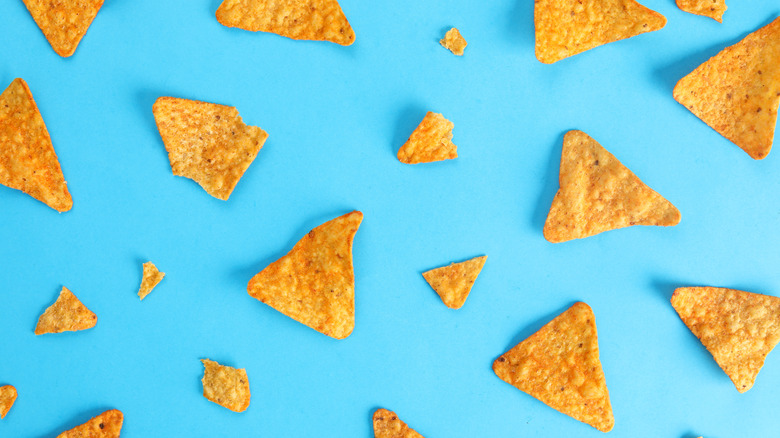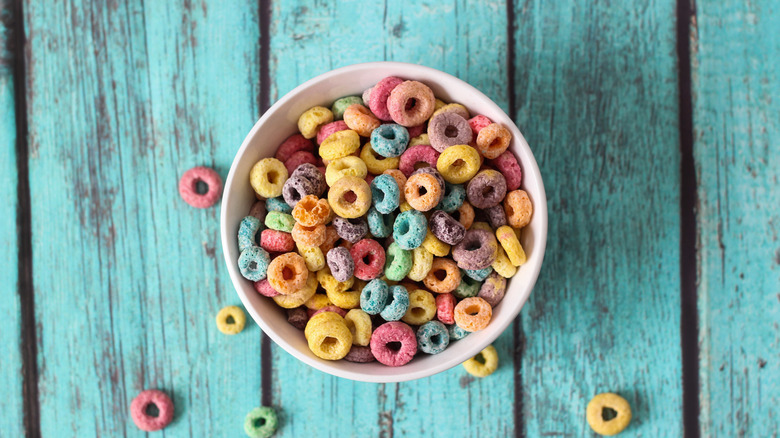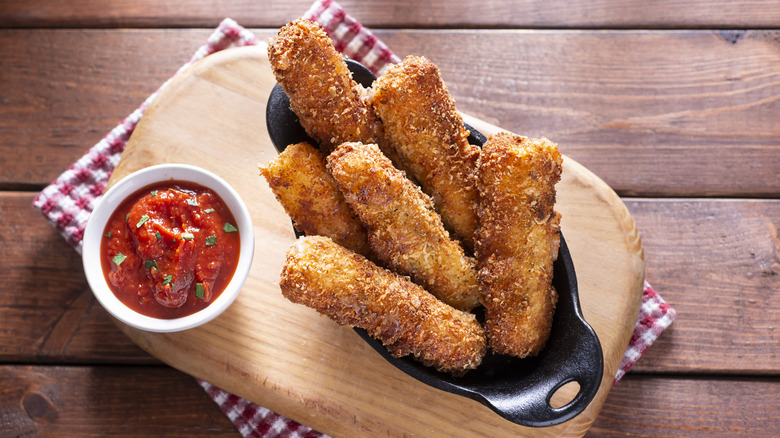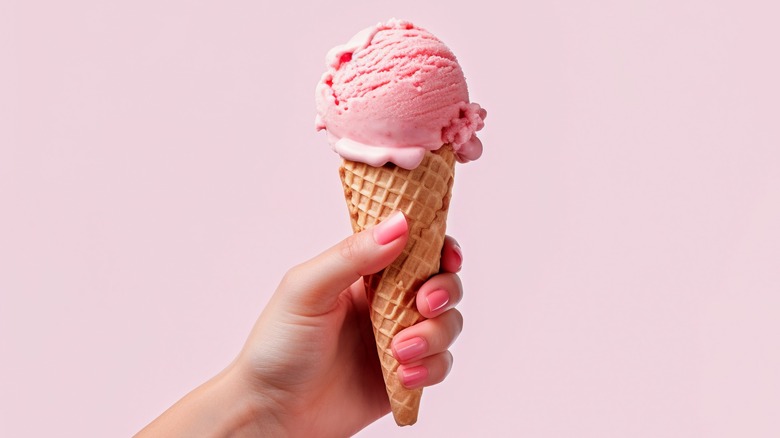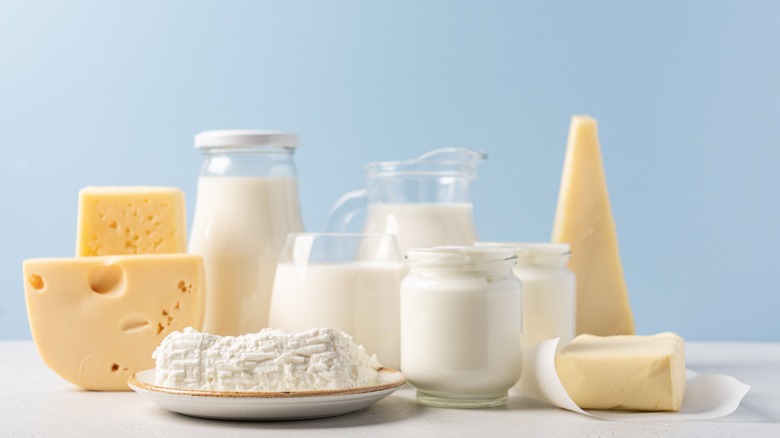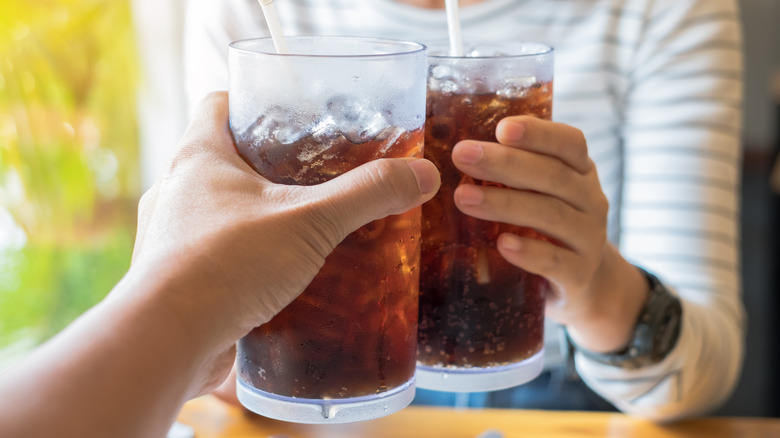13 Foods To Ditch For Lent In 2024
Lent is a period of religious observance for many Christians around the world who use it as a time to focus on prayer, self-discipline, and fasting. It is rooted in the biblical account of Jesus spending 40 days in the desert, where he fasted and refused the repeated temptations of Satan. In the weeks leading up to Easter Sunday, Christians around the world give up certain comforts and indulgences to deepen their spiritual connection and discipline. This could involve simple commitments, such as refraining from swearing or forgoing favorite activities like gaming. However, for many people, abstaining from specific foods is the focus, as it echoes Jesus' own fast in the desert and challenges self-control.
Choosing which foods to give up for Lent is highly personal and doesn't necessarily have to do with nutrition. The main thing is to pick something that you regularly enjoy in order to more deeply appreciate the sacrifice that Jesus made. While giving up traditionally indulgent foods like ice cream and cake is common, the real measure of sacrifice comes from abstaining from something that is a regular part of your life, ensuring the act carries genuine weight. The goal is to find a balance that truly tests your determination without setting yourself up for failure. Here are some suggestions to get you started.
1. Chocolate
One of the most popular foods to give up for Lent is chocolate, the rich, sweet, slightly bitter treat that many of us consume almost daily. The reason it makes such a good test of resolve is because there is no real substitute for it, meaning that you will truly be giving up something you love. If you vow to give up cookies or cake, you can always get around it by adding extra jam to a piece of toast or adding a few more tablespoons of sugar to your morning pancakes. But chocolate lovers know that nothing compares to this singular food. Carob, which is half-heartedly touted as a replacement, can barely be described as yummy, let alone chocolatey.
Made from the roasted nibs of cacao plants, chocolate has a particular texture and flavor due to its mixture of fat, acidity, and sugar. Cocoa butter, which is used to make milk chocolate and white chocolate, has a melting point that hovers around the temperature of the human body, providing that quintessential melt-in-the-mouth quality that chocolate lovers crave. Giving up chocolate for Lent isn't easy, but it will provide an opportunity for self-discipline.
2. Fast food
There are many reasons people eat fast food. The most obvious is that it is delicious, but it's also cheap and efficient. If you turn to McDonald's or Wendy's because you simply do not have the time to cook a meal for yourself or because you can't afford other options, giving it up for Lent is probably a bad idea. The goal isn't to make your life stressful and impractical — it's to sacrifice something you don't need in order to spark spiritual and self-reflection.
If fast food is simply a luxury that you indulge in a little too often even though you have food at home and could make the time to cook, now is the perfect opportunity to test your resolve and take a much-needed break. Luckily, there are plenty of ways to motivate yourself. With all its fat, mysterious ingredients, sugar, and carbohydrates, fast food is a known cause of many health issues, including heart attacks, strokes, dementia, cancer, and even psychiatric disorders. On top of these risks are all the gross things about fast food restaurants that most of us probably know but choose to ignore, like exploited workers, dangerous chemicals being used in packaging, and unsanitary equipment. These issues are just the tip of the iceberg, so if you're struggling to resist a Big Mac over the next few weeks, all you need to do is some quick Googling and you'll probably have no trouble fending off the urge.
3. Red meat
Biting into a thick, juicy burger is one of the great indulgences in life, but it's impossible to deny that red meat — whether it's a cheeseburger, a serving of bacon, or a tender veal cutlet — has some serious health downsides. Sure, it's full of iron and protein, but these benefits are severely outweighed by the fact that regular consumption of red meat can shorten your lifespan. For decades, scientists have been studying the long-term effects of this type of meat on human health, and the research consistently shows that the more you eat, the higher your risk of mortality, even when the meat is unprocessed.
It's tempting to ignore these findings given how inconvenient they are, but luckily, you don't have to cut red meat out of your diet entirely in order to lower the health risks. Reducing your intake to half a serving of red meat per day or taking breaks now and then can make a significant difference, and Lent is the perfect opportunity to try it out. Maybe you'll discover that there are other protein sources that you enjoy almost as much, and can incorporate them into your diet on a more regular basis.
4. Coffee
If you're one of those people who can't think or see straight until they've had that first cup of coffee in the morning, you're not alone. According to Drive Research, 73% of Americans drink coffee every day, while around the world, 2.25 billion cups of coffee are consumed daily. Caffeine is a stimulant that helps with focus, alertness, and even mood. It is also one of those creature comforts that many of us enjoy as part of our morning routine, that hot, sweet, milky drink that feels decadent and practical at the same time. These days, drinking coffee isn't just about kick-starting your day (though it excels in this department), but about providing a creamy, frothy, sometimes sweet incentive to get out of bed in the morning or start the commute to work.
These factors make coffee the perfect candidate for sacrificing during Lent. Giving it up will be a true test of your self-discipline and provide ample opportunity for self-reflection. However, you may want to be less cutthroat about this option than others. Quitting caffeine outright after drinking it regularly can lead to mild withdrawal symptoms such as headaches and fatigue. To set yourself up for success, you might want to start Lent by cutting back to one cup per day before transitioning to none, or drinking a lower dose of caffeine via black or green tea instead.
5. Ultra-processed snacks
When you think of processed foods, you might immediately think about fast food, but this category extends far beyond the reach of DQ and Burger King. In fact, some of the most prominent sources of ultra-processed foods are probably lurking in your pantry right now. Packaged snacks are a chief offender when it comes to processing, even when they're labeled with health-friendly packaging. You can usually deduce whether a food is ultra-processed by its long ingredient lists that contain unidentifiable words, numbers, and things you wouldn't normally cook with at home. Another way to identify them is that they usually bear few traces of whole foods. Some potato chip products, for example, are made by taking whole potatoes, cooking them, pulverizing them, dehydrating them into flakes, and then combining them with other ingredients and turning them all into a mass of dough. Based on their appearance, the resulting chips could be made out of anything.
Ultra-processed foods usually include emulsifiers, sweeteners, and preservatives, which, while not necessarily unhealthy in isolation, combine to create products that are full of saturated fat, sugar, and salt. Common foods in this category include chips, cookies, instant soups, and jerky, which are go-to snacks for many of us. Giving them up for Lent will require skipping entire aisles of the grocery store, making it a particularly challenging option.
6. Sugary breakfast foods
American breakfasts are notable for their sheer volume of sugar. Pancakes often come drenched in syrup and whipped cream, cereal is pumped full of sugar, and if you asked people whether donuts and cinnamon rolls are breakfast foods or desserts, they would probably say breakfast. Around the world, morning meals look strikingly different. The sweetest element of a classic English Breakfast is the baked beans, while in Japan, you're more likely to find miso soup and fish at the breakfast table than Froot Loops and waffles.
The precise numbers behind how much sugar is in a typical American breakfast are striking. A cup and a half of Cap'n Crunch with milk contains 25 grams of sugar, more than half the 39 grams found in a can of Coke. Meanwhile, a six-ounce container of Yoplait Harvest Peach yogurt contains 19 grams of sugar. Not only are excessive amounts of sugar unhealthy, but many of the sugary breakfast foods we eat are devoid of other health benefits we need to get us through the day, like fiber, protein, and healthy fats. Using Lent as an opportunity to try out different types of breakfast foods may help you discover other meals that will give you more energy and keep you satiated for longer.
7. Deep-fried foods
Crunchy and just the right amount of greasy, fried foods are one of the most delicious indulgences out there, comprising everything from crispy French fries to pillowy donuts. The crux of their mass appeal is the contrast of textures — the crunchy outer shell and the soft interior. Almost everything tastes better fried. Healthy foods like veggies and fish become rich and irresistible, while foods that are already indulgent, like cake batter and mac and cheese, can be transformed into a truly spectacular experience for your taste buds.
Sadly, as most of us are loath to admit, deep-fried food is also notoriously bad for you. For one thing, it is, by definition, bathed in fat. But even more concerning is the fact that compounds in some types of frying oil change under high heat, becoming potentially dangerous. For example, polyunsaturated fats, such as soybean oil, degrade into toxic compounds that can be the precursors to health conditions such as cardiovascular disease. Cutting fried food out of your diet for a few weeks will require plenty of self-discipline and be good for your health in the long run.
8. Desserts
If you want to cut right to the chase with Lenten sacrifice, dessert ticks all the boxes. Self-control? Check. An opportunity to make your life a little healthier? Check. Even better, skipping dessert prevents the temptation of finding a workaround. If you give up ice cream, you can always just indulge in frozen yogurt instead. If you give up cookies, you can just eat brownies and cake. Giving up an entire course forces you to commit to the spirit of the sacrifice and reflect on why you're doing it.
To make sure that you're not cutting corners with your commitment, avoid sweet treats at any time of the day. Donuts and pastries for breakfast are out. Abandon the urge to pair your afternoon cup of coffee with a few cookies. Now is the time to see how fully you can embrace the idea of restraint and sacrifice. If you need any negative motivation, it's easy to find reasons to cut back on sugar. Research consistently shows just how detrimental added sugar can be to our health, increasing the risks of diabetes, heart attacks, cancer, tooth decay, and premature death, just to name a few.
9. Alcohol
Of all the things people give up for Lent, alcohol might be the most common. It's easy to see why. It is both an indulgence that is difficult to abstain from and something that is detrimental to health. Because of its relaxing and addictive qualities, it's easy to get into the habit of drinking regularly, whether it's a beer or glass of wine after work or drinks with friends every weekend. According to the National Institute On Alcohol Abuse and Alcoholism (NIAAA), 29 million Americans over the age of 18 suffer from alcohol use disorder, which is defined as the inability to stop or cut back on alcohol consumption even when it's causing social, professional, or health problems. That's more than 11% of the entire adult population.
Even those who do not fall into this category might find themselves craving alcohol regularly or relying on it during social gatherings to get them out of their shell. This level of moderate drinking can also have negative health effects, including relatively mild issues with sleep and judgment, all the way up to potentially fatal conditions like cancer. If it's difficult to abstain from alcohol for several weeks, it's an excellent option for Lent. Not only will it give your body time to reset, but it will also require exactly the kind of effort and introspection that the spiritual period calls for.
10. Artificial sweeteners
There have never been more alternative sweeteners out there for people who have a sweet tooth but are trying to limit their sugar intake. Some people go the natural route by swapping sugar for honey, agave nectar, or maple syrup, but others choose from the many synthetic options on the market. Popular brands include Sweet'N Low, Truvia, and Splenda, and they're often found in diet or low-sugar drinks and foods in the form of aspartame, sucralose, and acesulfame potassium. These sweeteners provide all the sweetness of sugar without the calories and blood sugar spikes associated with it, which has made them easy to market and a seductive choice for consumers.
If it all seems a little too good to be true, it is. A growing body of research has linked these artificial sweeteners to an increased risk of strokes, heart attacks, and other cardiovascular issues. In 2023, the World Health Organization advised people to avoid them altogether, noting that the only way to lose weight long-term is to ease back on the amount of sweetness in your diet, regardless of the source. Seizing the opportunity of Lent to cut back on all forms of sweeteners is a good place to start.
11. Snacking
Many people choose to cut out certain activities or behaviors during Lent, such as gossiping, social media scrolling, and not washing the dishes. But its origins lie not only in refusing temptation and bad habits, but in fasting. For Catholics, Ash Wednesday and Good Friday are the designated days for fasting, while many abstain from meat during the entirety of Lent. Another option is to try intermittent fasting, a type of abstinence that is more manageable than going days without food, but which still requires self-discipline.
There are many ways to fast intermittently. You could limit yourself to two meals per day, reducing the window during which you can eat, or you could simply cut out snacking. Eating between meals can be a beneficial way to keep you satiated, but it can also lead to weight gain and a nutritional deficit. If you snack to the point where you aren't hungry for meals, your diet will probably consist of carb-heavy, nutritionally thin foods like chips, crackers, and pretzels rather than the nutritionally dense foods often served at mealtimes. Abstaining from snacks is a relatively pain-free way to fast during Lent, and might improve your overall health.
12. Dairy
Unlike many of the foods that Christians give up during Lent, dairy has a lot going for it nutritionally. It's full of protein, which we need for muscle growth and repair, and calcium which helps build strong bones and teeth. In fact, many scientists have raised concerns over the rise in nut milk as an alternative to dairy milk, pointing to their comparative lack of nutritional value. Few nut milks can compete with dairy when it comes to protein and calcium, and many are full of sugars and additives. Even cheese isn't always the health bad guy that it's made out to be. Parmesan, for example, has a low fat content and high concentration of calcium, phosphorus, and vitamins A, B12, and B6, while mozzarella is similarly low in fat and high in protein and calcium. Meanwhile, yogurt, especially unsweetened varieties, is a nutritional powerhouse full of nutrients and probiotics.
Giving up dairy for Lent is therefore a pure test of sacrifice. You won't be able to motivate yourself with promises of better health unless you typically limit your dairy intake to ice cream and Brie. It will cut out a huge swath of options for breakfast, lunch, and dinner, giving you ample opportunity to reflect on why you're doing it in the first place.
13. Soft drinks
We all know in our hearts that soft drinks aren't particularly good for us, but most of us would rather not think about it. Those cans of fizzy sugar are not easily replaced. There was a period when people tried to pretend that sparkling water did the trick, and a wave of brands stepped in with alluring packaging and seductive marketing to take advantage. But we all knew the truth: sparkling water is a great alternative to regular water. But to soda? Not even close. If you're accustomed to cracking open a can of Coke or Sprite, or even something more niche, everything about the experience conjures a sense of pleasure, from the sound of the metal tab clicking open and the hiss of carbonation to the tingling sensation in your nose when you take the first swig. And then there's the sweet, oh-so-refreshing flavor.
Giving up this sensory experience is not a happy prospect, but there are a plethora of reasons to do it anyway, and they all have to do with sugar. Take, for instance, a 12-ounce can of Coke. It contains 39 grams of sugar, which sounds like a lot but is still difficult to visualize. Now imagine a teaspoon. 39 grams of sugar equates to more than nine teaspoons. You may as well be eating cane sugar by the fistful. As hard as it is, soft drinks are well worth the effort to remove from your diet, Lent or not.
